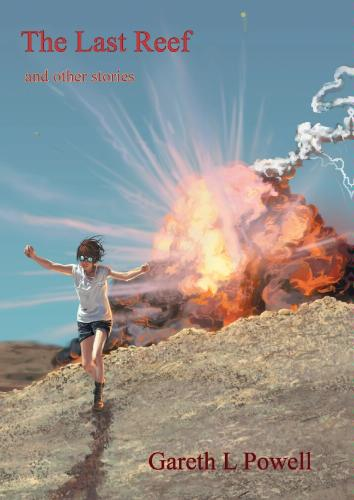
I will openly admit I know very little about Science Fiction. Not because I dislike it, but just because I read so little of it and I don’t know where to start. It isn’t often I thank Facebook, but in this instance it put me in touch with an old school chum, Becky, who is now married to Gareth L Powell, Sci Fi author extraordinaire. A Facebook chat ensued and Becky recommended The Reef to me as an introduction to her hubby’s work. I duly trotted off to the library to get a copy.
The Last Reef is a series of short stories, some of which have given rise to full length novels. I am not sure I am going to be able to describe this book and do it justice, but I’ll give it a try.
This collection may be catalogued under “Sci-Fi”, and it is, it has all the hallmarks. Spaceships? Check. Alien planets? Check. Lots of cool tech? Check. It also has very human and well-drawn characters, driven by real emotions and thoughts and. The backdrops that Powell has created also feel strangely familiar, despite the futuristic setting. I guess human motivations don’t change, just the tools at our disposal.
Out of the collection I had two particular favourites. The Last Reef explores the idea of artificial intelligence networks, and the mega-corporations exploiting them. I am not going to even attempt to explain this, it is far better to read the story. What really engaged me was the recognition that we may not be close to this level of technology yet, but I am not sure we are as far away as we think. The dire warnings from Professor Stephen Hawking on AI ran through my head as I read.
The second story which really got to me was Arches. Arches have been popping up randomly around the world, and when people go through them they don’t come back. An arch opens up in Oxfordshire, and of course our heroes decide to drive through it to try and find a lost brother. On the other side they find various waifs and strays and end up in a camp for those trying to work out what is going on. It turns out, if I may borrow a Dr Who quote, that it is all a bit “timey-wimey”, and really rather frightening too. As with all the stories, what makes these so believable is the characters, the setting makes life exciting, but I really bought into the inhabitants of Powell’s worlds, and wanted then to survive.
Apologies to Gareth for my rather inadequate review. The long and the short of it is that I loved all these stories, many of which have stayed with me. I have read a few books this year which keep popping back into my mind, and I can add The Last Reef and Arches to that list. They are even now making a strange alliance in my brain with Meadowland, Stoner, and The Vegetarian. Make of that what you will.







